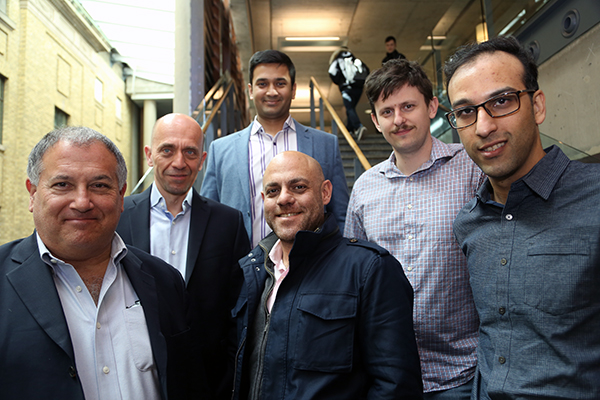
March 21, 2018
Marit Mitchell
Appulse Power Inc., a startup company founded by ECE alumni Ahsan Zaman (ElecE 0T9, ECE MASc 1T2, PhD 1T5), Behzad Mahdavikhah (ECE PhD 1T4), Aleksandar Radić (ECE PhD 1T4) and Professor Aleksandar Prodić (ECE), has been acquired by the multinational Silanna Semiconductor for an undisclosed amount.
“The success of Appulse is credit to the incredible talent and dedication of my three co-founders,” says Prodić. “This team has brought us into one of the biggest sales for an early-stage Canadian startup in the power electronics semiconductor industry, and I’m extremely proud of their accomplishments.”
Appulse designs application-specific integrated circuits to allow devices, including smartphones and tablets, to charge faster and consume less power. Its innovations enable more efficient charging and smaller components both inside and external to devices — this means shrinking the footprint required for power management inside mobile devices, and downsizing clunky chargers and adapters.
“Silanna’s vision is to grow this into a very large business and ultimately change the way power electronics is done,” says Silanna President Mark Drucker. “Leading electronic device manufacturers are keenly interested in improving power efficiency and increasing power density — with the acquisition of Appulse Power we have the ability to power mobile devices more quickly and efficiently, and that’s something that’s enormously appealing to our customers.”
Appulse has 13 employees across two offices in Toronto and San Diego, Calif., all of whom are staying with Silanna and will operate as an independent business unit within the company. The Toronto office will become Silanna’s first Canadian location, in addition to hubs in San Diego; Raleigh, North Carolina; Brisbane and Sydney, Australia; and Singapore.
The company’s roots extend back to Zaman’s second year as an undergraduate student in ECE, when he distinguished himself in Prodić’s class and joined his group as a summer researcher. “I’ve always felt driven to work on addressing real-world problems, and I became passionate about power management while working with Professor Prodić,” says Zaman. “Spinning this research into a startup is something I know my co-founders and I were extremely motivated to do — now we’re excited to take it to the next level with Silanna.”
“When we speak to industry about our technology, the most common response is ‘How quickly can we engage,’” says Mete Erturk, the CEO of Appulse who will now become vice-president of AC:DC products for Silanna. “We don’t have to do a lot of convincing — it’s clear that what we’re offering addresses a lot of existing pain points.”
Appulse received critical grants from NSERC’s idea2innovation (i2i) program and the Ontario Centres of Excellence SmartStart Seed Fund. The team also received early support from the University of Toronto’s Early-Stage Technology (UTEST) incubator as part of its 2014 cohort, and went on to join EvoNexus, the premier technology incubator and hub for Southern California’s startup community. There Drucker, a board member and EvoNexus alumnus himself, was introduced to the company’s innovative technology.
Drucker says the deep talent pool in Prodić’s group and at U of T Engineering was a major draw for him. “Ask any venture capitalist, and they’ll almost universally tell you they don’t invest in technology — they invest in people,” he says. “We’re very excited about continuing to collaborate with U of T. We’ve been extremely impressed with every researcher we’ve engaged with, and that speaks very highly to the quality of student at the University of Toronto.”
“Every year in the lab we create a few ideas that could turn into startups, but finding this complementary skill set in Ahsan, Behzad and Aleks — that’s something special,” says Prodić. “The most exciting thing has been seeing their success. For me as a teacher, that’s the best part.”
This story originally appeared on U of T Engineering News.
More information:
Jessica MacInnis
Senior Communications Officer
The Edward S. Rogers Sr. Department of Electrical & Computer Engineering
416-978-7997; jessica.macinnis@utoronto.ca